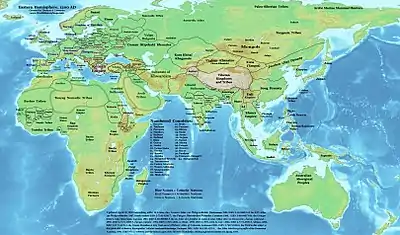1200
1200 (MCC) was a leap year starting on Saturday of the Julian calendar, the 1200th year of the Common Era (CE) and Anno Domini (AD) designations, the 200th year of the 2nd millennium, the 100th and last year of the 12th century, and the 1st year of the 1200s decade. As of the start of 1200, the Gregorian calendar was 7 days ahead of the Julian calendar, which was the dominant calendar of the time.
| Millennium: | 2nd millennium |
|---|---|
| Centuries: | |
| Decades: | |
| Years: |
| 1200 by topic |
|---|
| Leaders |
|
| Birth and death categories |
| Births – Deaths |
| Establishments and disestablishments categories |
| Establishments – Disestablishments |
| Art and literature |
| 1200 in poetry |
| Gregorian calendar | 1200 MCC |
| Ab urbe condita | 1953 |
| Armenian calendar | 649 ԹՎ ՈԽԹ |
| Assyrian calendar | 5950 |
| Balinese saka calendar | 1121–1122 |
| Bengali calendar | 607 |
| Berber calendar | 2150 |
| English Regnal year | 1 Joh. 1 – 2 Joh. 1 |
| Buddhist calendar | 1744 |
| Burmese calendar | 562 |
| Byzantine calendar | 6708–6709 |
| Chinese calendar | 己未年 (Earth Goat) 3896 or 3836 — to — 庚申年 (Metal Monkey) 3897 or 3837 |
| Coptic calendar | 916–917 |
| Discordian calendar | 2366 |
| Ethiopian calendar | 1192–1193 |
| Hebrew calendar | 4960–4961 |
| Hindu calendars | |
| - Vikram Samvat | 1256–1257 |
| - Shaka Samvat | 1121–1122 |
| - Kali Yuga | 4300–4301 |
| Holocene calendar | 11200 |
| Igbo calendar | 200–201 |
| Iranian calendar | 578–579 |
| Islamic calendar | 596–597 |
| Japanese calendar | Shōji 2 (正治2年) |
| Javanese calendar | 1108–1109 |
| Julian calendar | 1200 MCC |
| Korean calendar | 3533 |
| Minguo calendar | 712 before ROC 民前712年 |
| Nanakshahi calendar | −268 |
| Thai solar calendar | 1742–1743 |
| Tibetan calendar | 阴土羊年 (female Earth-Goat) 1326 or 945 or 173 — to — 阳金猴年 (male Iron-Monkey) 1327 or 946 or 174 |
| Wikimedia Commons has media related to 1200. |

The eastern hemisphere in 1200
Events
- August 25 – After touring an army through Aquitaine to assert his right to it,[1] John of England marries Isabella of Angoulême at Bordeaux.
- The Iroquois invade modern-day Ohio from the north.
- The Mongols defeat Northern China.
- The University of Paris receives its charter, from Philip II of France.
- The rebel Ivanko of Bulgaria is captured and executed by the Byzantine general Alexios Palaiologos.
- The Cherokee and Catawba tribes fight a great battle, in the Brown Mountains of modern-day North Carolina.
- Construction begins on the megalithic city of Nan Madol on Pohnpei in Micronesia.
- The Taíno culture develops in modern day Jamaica.
- At about this date, Hangzhou in Tang dynasty China overtakes Baghdad as the world's largest city.
Births
- January 19 – Dōgen Zenji, founder of Sōtō Zen (d. 1253)
- exact date unknown
- Al-Abhari, Persian philosopher and mathematician (d. 1265)
- John Fitzalan, Lord of Oswestry (d. 1240)
- Ingerd Jakobsdatter, Danish countess (d. 1258)
- probable
- Ulrich von Liechtenstein, German nobleman and poet (d. 1278)
- Adam Marsh, English Franciscan scholar and theologian (approximate date; d. 1259)
- Matthew Paris, English Benedictine monk and chronicler (approximate date; d. 1259)
- Rabbi Isaac ben Moses of Vienna (d. 1270)
- Mindaugas, Great King of Lithuania (approximate date; d. 1263)
- William of Sherwood, English logician (approximate date; d. c.1272)
Deaths
- April 8 – Adalbert III of Bohemia, archbishop (b. 1145)
- April 23 – Zhu Xi, Chinese Confucian philosopher (b. 1130)
- September 17? – Emperor Guangzong of Song (b. 1147) [2]
- December – Gilbert Horal, 12th Grand Master of the Knights Templar
- date unknown – Odo of Canterbury, theologian and abbot of Battle (date of birth unknown)
References
- Warenęi, W. L. (1961). King John. University of California Press. p. 64.
- Michael Dillon (December 1, 2016). Encyclopedia of Chinese History. Taylor & Francis. pp. 638–. ISBN 978-1-317-81716-1.
This article is issued from Wikipedia. The text is licensed under Creative Commons - Attribution - Sharealike. Additional terms may apply for the media files.